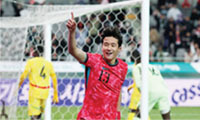I mean, sure, as Florida governor, he helped his brother snatch the 2000 election. And that led to two decade-long botched wars that cost tens of thousands of lives and trillions of dollars. The nation will be dealing for a long time with struggling veterans and the loss of American prestige. Not to mention that W. let Wall Street gamble away the economy, which is only now finally creeping back.
But, all that aside, shouldn’t John Ellis Bush have the right to make the case that he is his own man?
In his foreign policy speech in Chicago on Wednesday, Jeb was dismissive toward those who want to know where he stands in relation to his father and brother. “In fact,” he said, mockingly, “this is a great, fascinating thing in the political world for some reason.”
For some reason?
Like the Clintons, the Bushes drag the country through national traumas that spring from their convoluted family dynamic and then disingenuously wonder why we concern ourselves with their family dynamic.
Without their last names, Hillary and Jeb would not be front-runners, buoyed by networks of donors grateful for appointments or favors bestowed by the family. (When Jeb and W. ran gubernatorial races in 1994, they both mined their mother’s Christmas card list for donors.)
Yet Jeb is bristling with Jane Austen-style condescension, acting as though he would still be where he is if his last name were Tree. The last two presidents in his party were his father and brother, and his brother crashed the family station wagon into the globe, and Jeb is going to have to address that more thoroughly than saying “there were mistakes made in Iraq for sure.”
He says he doesn’t want to focus on “the past,” and who can blame him? But how can he talk about leading America into the future if he can’t honestly assess the past, or his family’s controversial imprint?
In his speech, he blamed President Obama for the void that hatched ISIS, which he also noted didn’t exist in 2003 at the dawn of “the liberation of Iraq.” Actually, his brother’s invasion of Iraq is what spawned Al Qaeda in Iraq, which drew from an insurgency of Sunni soldiers angry about being thrown out of work by the amateurish and vainglorious viceroy, Paul Bremer.
Although Jeb likes to act as though his family is irrelevant to his ambitions, Bushworld stalwarts recite the Bush dynasty narrative like a favorite fairy tale:
The wonky Jeb, not the cocky W., was always 41’s hope. H.W. and Bar never thought W., unprepared, unruly and with a chip on his shoulder, would be president. His parents’ assumption that he was The One got in Jeb’s head and now the 62-year-old feels he needs “to try to correct and make up for some of W.’s mistakes,” as one family friend put it. The older Bush circle seems confident that Jeb sided with his father and Brent Scowcroft on the folly of letting the neocons push America into diverting from Osama to Saddam.
So for Bushworld, Jeb is the redeemer, the one who listens and talks in full sentences that make sense, the one who will restore the luster of the Bush name. But if you want to be your own person, you have to come up with your own people.
W. was a boy king, propped up by regents supplied by his father. Since he knew nothing about foreign affairs, his father surrounded him with his own advisers: Colin Powell, Condi Rice and Dick Cheney, who joined up with his pal Donald Rumsfeld and absconded with W.’s presidency.
Jeb, too, wanted to bolster his negligible foreign policy cred, so the day of his speech, his aide released a list of 21 advisers, 19 of whom had worked in the administrations of his father and his brother. The list starts with the estimable James Baker. But then it shockingly veers into warmongers.
It’s mind-boggling, but there’s Paul Wolfowitz, the unapologetic designer of the doctrine of unilateralism and pre-emption, the naive cheerleader for the Iraq invasion and the man who assured Congress that Iraqi oil would pay for the country’s reconstruction and that it was ridiculous to think we would need as many troops to control the country as Gen. Eric Shinseki, then the Army chief of staff, suggested.
There’s John Hannah, Cheney’s national security adviser (cultivated by the scheming Ahmed Chalabi), who tried to stuff hyped-up junk on Saddam into Powell’s U.N. speech and who harbored bellicose ambitions about Iran; Stephen Hadley, who let the false 16-word assertion about Saddam trying to buy yellowcake in Niger into W.’s 2003 State of the Union; Porter Goss, the former C.I.A. director who defended waterboarding.
There’s Michael Hayden, who publicly misled Congress about warrantless wiretapping and torture, and Michael Chertoff, the Homeland Security secretary who fumbled Katrina.
Jeb is also getting advice from Condi Rice, queen of the apocalyptic mushroom cloud. And in his speech he twice praised a supporter, Henry Kissinger, who advised prolonging the Vietnam War, which the Nixon White House thought might help with the 1972 election.
Why not bring back Scooter Libby?
If he wants to reclaim the Bush honor, Jeb should be holding accountable those who inflicted deep scars on America, not holding court with them.
Where’s the shame?
For some reason, Jeb doesn’t see it.
스마터리빙
more [ 건강]
[ 건강]이제 혈관 건강도 챙기자!
[현대해운]우리 눈에 보이지 않기 때문에 혈관 건강을 챙기는 것은 결코 쉽지 않은데요. 여러분은 혈관 건강을 유지하기 위해 어떤 노력을 하시나요?
 [ 건강]
[ 건강]내 몸이 건강해지는 과일궁합
 [ 라이프]
[ 라이프]벌레야 물럿거라! 천연 해충제 만들기
 [ 건강]
[ 건강]혈압 낮추는데 좋은 식품
[현대해운]혈관 건강은 주로 노화가 진행되면서 지켜야 할 문제라고 인식되어 왔습니다. 최근 생활 패턴과 식생활의 변화로 혈관의 노화 진행이 빨라지고
사람·사람들
more많이 본 기사
- 아이폰 있으면 국내선 여권 불필요
- 메디케이드·식량·주거 보조 이용… 영주권 ‘불이익’
- 한인 마켓도 덮친 ‘대대적 이민 단속’
- [화제] 동명이인도 ‘깜짝’ … 스크래치 100만달러 잭팟
- ‘이경실 子’ 손보승, 군 복무기간 중 ‘달걀 판매’ 영리활동..징계 대상자 되나?
- 손흥민, ‘임신 협박 3억 갈취’ 20대女 재판에 ‘증인 출석’... 50분간 비공개 신문
- [송년모임] 월남전 참전자회 내달 14일
- [송년모임] 호남 향우회 내달 16일
- ‘♥이용대 열애설’ 에이프릴 윤채경, 소나무 같은 취향? “이상형은 이민호”
- “첨단기술 노린 중국, 미국에 지난 … 1
- 푸드스탬프 재신청 의무화 추진 300여만명 식비지원 상실 위기
- 사유리, 5세 子 외국인 학교 보냈다 “다 영어로 대화..기 죽어”
- 고개 숙인 일본, 주머니에 손 넣은 중국
- 계속되는 민주당의 헛손질
- “무너진 캘리포니아 재건하겠다”
- 사라진 백악관의 이스트 윙
- 홍명보호, 가나에 1-0 승리로 유종의 미… 내용은 아쉬워
- ‘호객 없는 수산시장’… 제철 맞은 방어, 새우 먹으러 울진 간다
- [미국은 지금] 미국 정치의 파산과 그 댓가
- 한인타운 올림픽·버몬트 총격 사건
- ‘200억 매출’ 진재영, 김치 사업 도전하나.. “혼자 할 수 있을지 모르겠지만”
- 영국 학교, 케데헌 ‘금지령’… “기독교와 맞지 않아”
- “한인사회를 섬기는 최고의 의료그룹 SMG”
- ‘트럼프 신속대응팀’ 비판에 연방 법무부 내부 ‘흔들’
- [경제 트렌드] “거스름 줄 동전이 없어”… 1센트 폐지 혼란
- 한인은행 수익률… LA 카운티 은행 중위권 그쳐
- 듀스, 28년만 신곡 ‘라이즈’ 발매…故김성재 목소리 AI로 복원
- “티켓은 비자아냐”
- LA 곳곳 ‘폭우 후유증’… 타운도 팟홀 몸살
- 성범죄자에 ‘불륜 상담’ 하버드 전총장 활동중단
- 이탈리아 축구, 3회 연속 월드컵 본선 탈락 위기 ‘악몽’
- 한국·캔자스 운전면허 상호인정… 가주는 ‘깜깜’
- [수요 에세이] 부석사, 배흘림기둥에 기대어 보다
- 이젠 프리웨이도 달리는 웨이모
- AI 확산에 올해 일자리 110만개 사라져
- “소득대비 과도 공제… IRS 감사타겟 될 수도”
- [만화경] ‘국부론’과 “기업이 곧 국력”
- 비트코인 9만달러 붕괴 최고치 대비 29% 하락
- ‘네이버 플러스’호스피스 자원봉사자 31명 배출
- 디트로이트, 18년 만에 10연승 ‘신바람’
- 챗GPT·X 등 한때 접속 불통 사태
- 소비 양극화… 저소득층 패스트푸드도 못가
- 맥도널드, 연말 인기메뉴 ‘맥립’ 출시
- “워싱턴교협 50년, 다음세대에 방향 제시하는 좌표”
- 대만, 첨단반도체 통제 “사전 허가받아야 수출”
- 현대차, 러시아 복귀하나… “현지 상표 등록”
- 로봇시대 게임체인저… K원팀으로 100조시장 뚫는다
- 홈디포, 실적 하향 ‘소비 둔화 경고음’
- 김&리 회계법인, 업무협약 체결
- 베조스, AI 스타트업 CEO로 경영 일선 복귀
1/5지식톡

-
 테슬라 자동차 시트커버 장착
0
테슬라 자동차 시트커버 장착
0테슬라 시트커버, 사놓고 아직 못 씌우셨죠?장착이 생각보다 쉽지 않습니다.20년 경력 전문가에게 맡기세요 — 깔끔하고 딱 맞게 장착해드립니다!장착비용:앞좌석: $40뒷좌석: $60앞·뒷좌석 …
-
 식당용 부탄가스
0
식당용 부탄가스
0식당용 부탄가스 홀세일 합니다 로스앤젤레스 다운타운 픽업 가능 안녕 하세요?강아지 & 고양이 모든 애완동물 / 반려동물 식품 & 모든 애완동물/반려동물 관련 제품들 전문적으로 홀세일/취급하는 회사 입니다 100% …
-
 ACSL 국제 컴퓨터 과학 대회, …
0
ACSL 국제 컴퓨터 과학 대회, …
0웹사이트 : www.eduspot.co.kr 카카오톡 상담하기 : https://pf.kakao.com/_BEQWxb블로그 : https://blog.naver.com/eduspotmain안녕하세요, 에듀스팟입니다…
-
 바디프렌드 안마의자 창고 리퍼브 세…
0
바디프렌드 안마의자 창고 리퍼브 세…
0거의 새제품급 리퍼브 안마의자 대방출 한다고 합니다!8월 23일(토)…24일(일) 단 이틀!특가 판매가Famille: $500 ~ $1,000Falcon: $1,500 ~ $2,500픽업 & 배송직접 픽업 가능LA…
-
 바디프렌드 안마의자 창고 리퍼브 세…
0
바디프렌드 안마의자 창고 리퍼브 세…
0거의 새제품급 리퍼브 안마의자 대방출 한다고 합니다!8월 23일(토)…24일(일) 단 이틀!특가 판매가Famille: $500 ~ $1,000Falcon: $1,500 ~ $2,500픽업 & 배송직접 픽업 가능LA…
케이타운 1번가
오피니언
 정숙희 논설위원
정숙희 논설위원사라진 백악관의 이스트 윙
 파리드 자카리아 워싱턴포스트 칼럼니스트 / CNN ‘GPS’ 호스트
파리드 자카리아 워싱턴포스트 칼럼니스트 / CNN ‘GPS’ 호스트 계속되는 민주당의 헛손질
 김동찬 시민참여센터 대표
김동찬 시민참여센터 대표 [미국은 지금] 미국 정치의 파산과 그 댓가
 성영라 수필가 미주문협 부이사장
성영라 수필가 미주문협 부이사장 [수요 에세이] 부석사, 배흘림기둥에 기대어 보다
 서정명 / 서울경제 논설위원
서정명 / 서울경제 논설위원[만화경] ‘국부론’과 “기업이 곧 국력”
 노세희 부국장대우·사회부장
노세희 부국장대우·사회부장 대한은 다시 살아나는가
 민경훈 논설위원
민경훈 논설위원사자와 생쥐, 그리고 인간 이야기
 한형석 사회부 부장대우
한형석 사회부 부장대우 한인타운 교통 인프라 개선 기대
 박영실 시인·수필가
박영실 시인·수필가 [화요칼럼] 말의 위력
1/3지사별 뉴스

‘네이버 플러스’호스피스 자원봉사자 31명 배출
뉴저지 팰리세이즈팍에 위치한 비영리단체‘네이버 플러스’(Neighbor Plus·이사장 양춘길 목사)가 말기암 환자와 그 가족들을 돌보는 제4…
회장선거(뉴저지한인회) 놓고 내분사태 ‘악화일로’

“워싱턴교협 50년, 다음세대에 방향 제시하는 좌표”
“구슬이 서 말이라도 꿰어야 보배라는 말이 있다. 구슬을 꿰어 보배를 만들어 낸 편찬위원회에 감사하고, 지난 50년간 그 구슬을 만들어낸 여러…
장학생 20명 선정…장학금 총 3만불

사우디 빈살만 “1조달러 투자”…7년만의 방미환대 트럼프에 선물
사우디아라비아가 18일 대미 투자액을 기존에 발표했던 6천억 달러(약 876조원)에서 1조 달러(약 1천460조원) 규모로 상향 조정하기로 했…
방한후 美입국했다 석연찮게 구금된 한인과학자, 4개월만에 석방

오늘 하루 이 창 열지 않음 닫기 




















































.png)


댓글 안에 당신의 성숙함도 담아 주세요.
'오늘의 한마디'는 기사에 대하여 자신의 생각을 말하고 남의 생각을 들으며 서로 다양한 의견을 나누는 공간입니다. 그러나 간혹 불건전한 내용을 올리시는 분들이 계셔서 건전한 인터넷문화 정착을 위해 아래와 같은 운영원칙을 적용합니다.
자체 모니터링을 통해 아래에 해당하는 내용이 포함된 댓글이 발견되면 예고없이 삭제 조치를 하겠습니다.
불건전한 댓글을 올리거나, 이름에 비속어 및 상대방의 불쾌감을 주는 단어를 사용, 유명인 또는 특정 일반인을 사칭하는 경우 이용에 대한 차단 제재를 받을 수 있습니다. 차단될 경우, 일주일간 댓글을 달수 없게 됩니다.
명예훼손, 개인정보 유출, 욕설 등 법률에 위반되는 댓글은 관계 법령에 의거 민형사상 처벌을 받을 수 있으니 이용에 주의를 부탁드립니다.
Close
x